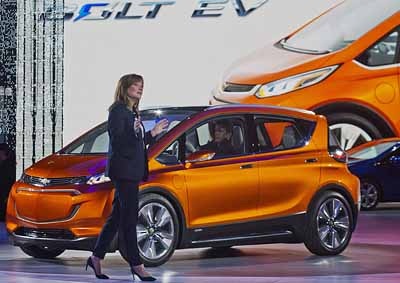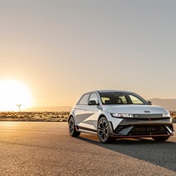
DETROIT, Michigan - Talk about turning things on their head. Petrol in the US is now half what it as a few months ago and that's hitting the "alternative fuel" business.
We'd all like to be green but it's a tough call when the price of carbon-based propulsion goes through the floor - and could stay there for some time. Nevertheless, some automakers are committed to pure battery or petrol/diesel electric hybrids which come with a price penalty.
Simply put, the slump in the oil price thanks to the US becoming the world's largest oil producer has made it harder for companies to boost investment in "alternatives" in a market that is back in love with "gas-guzzlers". Though to be fair, modern cars can hardly be called "guzzlers' any more.
DOUBLE-DOWN ON BATTERIES
So, General Motors and Hyundai each took a stand at the North American International Auto Show in Detroit on Monday (Jan 12) towards a lower-carbon future. Few others followed suit.
GM doubled down on its position in the electric car market, unveiling a 320km-range Chevrolet Bolt to challenge Tesla, and a snazzy updated Volt.
The Bolt, still in concept form but envisioned for a 2017 debut, is a small crossover that will reduce the entry price to a full-range electric to $30 000 (about R346 000) after government tax incentives. GM's chief executive Mary Barra called the Bolt "a real game-changer" in the electric-vehicle market.
"This is truly an EV for everyone," she said at the show, implicitly contrasting the Bolt with Tesla's best-selling, 450km-range Model S, a larger, luxury electric with a base price of $70 000 (about R807 000).
'GREATER RANGE? WE'VE DELIVERED'
GM also launched an improved model of the Chevy Volt, its plug-in hybrid that, while remaining the best-selling US electric since it was brought to market four years ago, has still not captured a mass audience.
The new Volt boosts the range on the electric engine alone to 80km from the previous 50km, and, with both electric and gas engines engaged, has a much faster acceleration than before. Barra pointed out: "Owners wanted to see a greater range on the new model. We have delivered."
Hyundai introduced its standard hybrid and plug-in hybrid Sonatas at Detroit 2015 as it pushed ahead with an all-technologies strategy for the US and global market. Mike O'Brien, Hyundai's boss of corporate and product planning for North America, said: "While low fuel prices are the hot topic right now we all recognise the long-term need to reduce CO2 emissions.
"We intend to lead the way to this more-efficient future."
'SUSTAINABLE TREND ON FUEL'
The route, though, has become steeper with the plunge in petrol. Alec Gutierrez, an industry analyst at Kelley Blue Book, pointed out: "There's been a shift in consumer preferences nationwide for three months now. That shift from small crossover, mid-size and compacts is maigrating to large trucks, SUV's and utilities - even to luxury vehicles.
"This trend is sustainable because there are expectations that fuel prices are going to stay low at least for another six months."
At the same time, said Gutierrez, another dynamic was working: automakers have incorporated fuel-saving tech in their traditional combustion engines, making them more competitive with hybrids and electrics.
Nevertheless, all automakers are under tough government pressure to improve the average fuel-efficiency of their fleets to 4.2 litres/100km by 2025. That will force everybody to come up with alternative fuel versions of their most popular cars, even if they don't work, pricewise, for the market.
Industry specialists say the cost of reaching the 2025 goals "is huge" for car producers and that they are beginning to push back against the government over the tight deadline. Martin Zimmerman, a professor at the University of Michigan and former head economist at Ford, indicated:
"The regulators are going to have to come to terms with these lower oil prices."
PRESSURE FROM EUROPE
But the targets won't be rolled back completely. Audi head of sales Luca de Meo said: "We have to electrify many of our cars to satisfy the requirements."
But then you can't make people buy them...
Mercedes-Benz chairman Dieter Zetsche, in the US for the Detroit show, said more companies were coming out with fewer fuel-efficient SUV's, in part because buyers are less concerned about fuel costs, but he acknowledged that the industry had to improve because Europe and even Asian countries were pressing them on CO2 emissions.
And he added ominously: "At the end of the day, we will not have sufficient oil."




 Publications
Publications
 Partners
Partners















